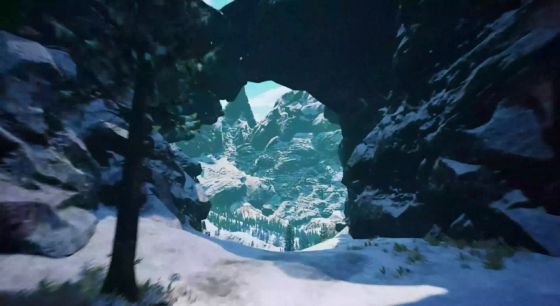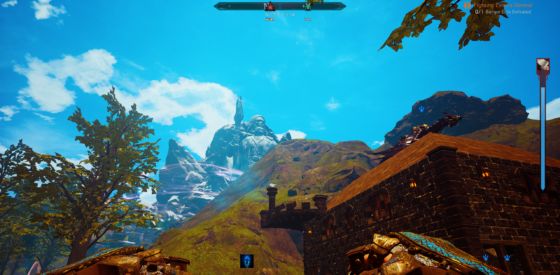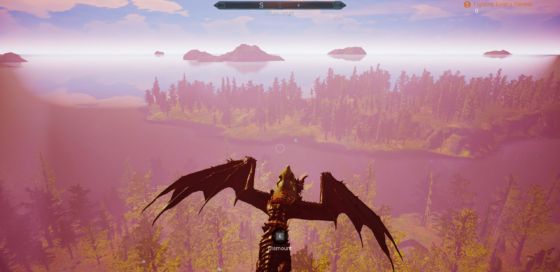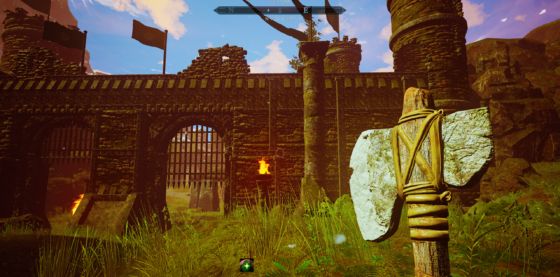The forest is quiet.
Somewhere on the far side of a small grove a trees, a boar is grunting to itself as it roams through the brush. Small birds chirp quietly to themselves. Just past the grove, the sound of water is faint as it brushes against the bank. What a world to explore...
Ignus is a pretty place. The greenery is vast and lush, the hills and mountains reach into the sky, slashing through otherwise natural pathways. Occasionally, the land carves into the ground, and fills the holes in with acidic pools and deep caverns. Around every corner, there is a new world to see, a new mass to explore.
You are a wizard, birthed in the magma of an old, time-worn citadel, and this world is yours. Leave safety at your leisure, and welcome to Citadel: Forged with Fire.
 Gameplay - 7 / 10
Gameplay - 7 / 10
At first blush, there isn’t a great deal about Citadel that really captures the imagination. Players given brief tutorial quests that illustrate how to collect items, briefly explain crafting, spells, and how to navigate the world. The later tutorial explains building and places to expand crafting options, and then the player is loosed into the world, to find or build whatever they may fancy.
Players’ primary interactions with the world are in collecting goods, fighting enemies, crafting items, and leveling their character and skills. Every major verb in the game grants experience, giving players the opportunity to theoretically level themselves via foraging, or crafting, or combat, or quests, or any combination the player chooses.
Gameplay boils down to “About what you’d expect.” in summary. Collect items, gain levels up upgrade equipment. Better equipment allows the player more defense and offense, which opens new areas and enemies, which house items that are needed for higher level crafts. Crafting is straightforward, the skill tree players develop as they level is clear and linear, combat is about as awkward as any first-person game without ever being too frustrating, and crafting and exploration take up a lion’s share of most of the player’s playtime until late-game grinding sets in and players become hunters more than explorers.
Innovation - 7 / 10
As above, so here. There’s nothing in Citadel that will feel unfamiliar to fans of games like Rust or Ark - Survival Evolved. The game is mostly structured into major goals. While working from spawn, explore to develop enough material to build a home. Once home is built, leveling to acquire crafting benches. From crafting capable, leveling to learn better recipes. From better recipes, pushing to increasingly challenging areas to acquire harder to find items. Once they have higher level items, it starts the late-game grind to achieve the highest level equipment and optimizing skill layout and power.
As with any game of this explore, build, survive genre, a lot of the improving means gaining levels and optimizing patterns to reduce the time between levels, material waste, and increase character survivability. So, as innovation goes, Citadel does what it does with competence, but relatively little novelty.
 Community - 9 / 10
Community - 9 / 10
One of the struggles new players face in Citadel is that, while there are significant opportunities to explore, that is more or less all a player will do for the first few hours. Building is tutorialized in the most basic sense, so how a house is actually built isn’t ever made abundantly clear. How the skill trees work is not made overly clear. What will be relevant to a player is never made clear. The result is, much like the player character, new players are birthed whole but ignorant of a great deal of how one is meant to take part in the world.
Pleasantly, the community in-game tend to be immediately available and helpful. Given a limited server size of 50 players, it’s rare to find a server without at least a mild sense of a close-knit community, and helpful dialog is shared regularly among players in any given server.
The only complaint is that players connecting isn’t terribly easy. Players can join Houses, which offer shared interaction, not unlike a guild in other online games. Players can also join parties with one another. However, parties and Houses share a single tab in the menu, and though they function, it feels like it was put together only to function, and operating within the bounds of that is difficult and exclusively relies on utilitarian tools. Even when partying with another player, things feel disconnected and difficult to really coordinate outside of having another player online at the time you want to do things, and doing it right then.
Graphics / Sound - 8 / 10
Ignus is a feast for the senses. The desire to explore is a never-ending pull that sings sweet siren songs to players. The textures of the forests, the lake beds, the craggy mountaintops, the long-weathered forges, the grand plains, the ocean are all decadent. The desire to just climb a mountain for the joy of it, or park on the side of a lake and just watch the water for a moment is always there.
Likewise, the sound is minimal. Small musical scores follow the players’ jaunts through the woodlands, snowy peaks, and hikes along the lake. The musical isn’t precisely memorable, but the feel of being out in nature is palpable, without doing anything to detract from the experience of being out in the elements, taking nature in stride.
 That said, Citadel is occasionally buggy. Player animations happen disjointedly or out of sequence of the thing happening on screen. Sometimes the server takes a few extra moments to parse player input, so things queue up as players press buttons, then it all spills out at exactly the same time as the server quickly catches up. Visually, the game is opulent without ever becoming too much, phonically the experience is pleasant and airy, but all together in motion sometimes feels a little disjointed and awkward.
That said, Citadel is occasionally buggy. Player animations happen disjointedly or out of sequence of the thing happening on screen. Sometimes the server takes a few extra moments to parse player input, so things queue up as players press buttons, then it all spills out at exactly the same time as the server quickly catches up. Visually, the game is opulent without ever becoming too much, phonically the experience is pleasant and airy, but all together in motion sometimes feels a little disjointed and awkward.
Value for Money - 7 / 10
Given the above, and the moments where the server and player inputs are mismatched, it can be hard to really commit to the idea that Citadel is entirely fair to its players. Sometimes clicking seems to produce no effect, or the spell is cast, mana is lost, but no effect or damage comes out. Then the player must wait out the cooldown to no benefit. As players fight higher level enemies, with their significant health bars and even more significant damage, the margins for error become significantly more narrow as each hit represents a deep gouge in the player’s total health, and when the server hiccups, the player’s frantic inputs might be the only thing keeping a character alive, and if the server slips, then that player is dead, potentially unearned, with their blood literally the cracks of the mountain their loot now rests on.
Without the little polish elements, it can be hard to see Citadel as much more than an alternative. The asking price isn’t significantly high, but with a single game map and not much to find in the story department, it can be hard to feel like it represents a significant improvement over other alternatives.
Summary - 7.5 / 10
Citadel: Forged with Fire is a game that manages to strike powerfully at the impulse to go spend some time in nature. The wild life are fun to watch from a distance, the water lapping on the shores of the lakes and oceans feel calming in the same way lounging at a beach in life can be, and drifting through the skies on the wings of flight potions and fast brooms is an experience that’s hard to find fault with.
But there are server and polish issues that makes the game feel a little disjointed, on occasion during significant moments. The ramp of enemy difficulty by increasing health of and damage by enemies feels more tedious than difficult. The grind for better gear to unlock the opportunity to grind better gear is a large majority of late-game play experience, and it’s hard not to find that sort of thing exhausting.
But, for players who don’t mind an experience that settles pretty comfortably into automating efficient travel and combat habits, crafting spaces, building outposts and homes, and piloting their tamed creatures, Citadel: Forged with Fire is a great game to pick up, especially for those with a spark to explore. It is, however, one of many, and not necessarily something that elevates it above its peers.
 Pros:
Pros:
Opulent scenery and lush landscapes makes for a digital adventurer’s paradise.
Tons of crafting options and building potential means players can choose from one of many perfectly viable builds and playstyles.
Experience is distributed fairly widely throughout the play styles, so players are never obligated to play to any mechanic if they don’t want to, and will still have the opportunity to level up and take quests.
Cons:
A lack of polish means visuals sometimes mismatch what happens on screen, and skills and damage will seem to happen without any ability to alter it as a player.
Occupies a fairly crowded genre, without a great deal in the way of novelty.
Repetitive gameplay.
Late game aspects rely on exploring higher level areas with difficult enemies, so players trying to do late-game crafting and grinding will find themselves having to cope with high level enemies, even if that just means picking equipment that will enable escape rather than combat.